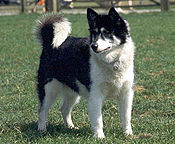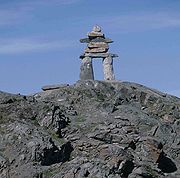
Symbols of Nunavut
Encyclopedia

Nunavut
Nunavut is the largest and newest federal territory of Canada; it was separated officially from the Northwest Territories on April 1, 1999, via the Nunavut Act and the Nunavut Land Claims Agreement Act, though the actual boundaries had been established in 1993...
is one of Canada
Canada
Canada is a North American country consisting of ten provinces and three territories. Located in the northern part of the continent, it extends from the Atlantic Ocean in the east to the Pacific Ocean in the west, and northward into the Arctic Ocean...
's territories
Provinces and territories of Canada
The provinces and territories of Canada combine to make up the world's second-largest country by area. There are ten provinces and three territories...
, and has established several territorial symbols.
Symbols of nunavut
| Symbol | Image | Adopted | Remarks | |
|---|---|---|---|---|
| Coat of arms Coat of arms A coat of arms is a unique heraldic design on a shield or escutcheon or on a surcoat or tabard used to cover and protect armour and to identify the wearer. Thus the term is often stated as "coat-armour", because it was anciently displayed on the front of a coat of cloth... |
Coat of arms of Nunavut Coat of arms of Nunavut The coat of arms of the territory of Nunavut was granted by a warrant of Roméo LeBlanc, Governor General of Canada, dated 31 March 1999, one day before the territory of Nunavut, Canada was created. The same document specified the flag of Nunavut.- Overview :... |
March 31, 1999 | Contains symbols of the riches of land, sea and sky | |
| Motto Motto A motto is a phrase meant to formally summarize the general motivation or intention of a social group or organization. A motto may be in any language, but Latin is the most used. The local language is usual in the mottoes of governments... |
Nunavut Sannginivut ᓄᓇᕗᑦ ᓴᙱᓂᕗᑦ ("Nunavut, Our land, our strength") |
March 31, 1999 | Granted with other elements of the coat of arms | |
| Flag Flag A flag is a piece of fabric with a distinctive design that is usually rectangular and used as a symbol, as a signaling device, or decoration. The term flag is also used to refer to the graphic design employed by a flag, or to its depiction in another medium.The first flags were used to assist... |
Flag of Nunavut Flag of Nunavut The flag of Nunavut was proclaimed on 1 April 1999, along with the territory of Nunavut in Canada. It features a red inukshuk—an Inuit land marker—and a blue star, which represents the Niqirtsuituq, the North Star, and the leadership of elders in the community. The colours represent the riches of... |
 |
April, 1999 | |
| Mace Ceremonial mace The ceremonial mace is a highly ornamented staff of metal or wood, carried before a sovereign or other high official in civic ceremonies by a mace-bearer, intended to represent the official's authority. The mace, as used today, derives from the original mace used as a weapon... |
The Mace of Nunavut | March 30, 1999 | It is the symbol of the Authority of the Legislative Assembly. It is a ceremonial staff carried by the Sergeant-at-Arms into the Chamber. | |
| Flower Flower A flower, sometimes known as a bloom or blossom, is the reproductive structure found in flowering plants . The biological function of a flower is to effect reproduction, usually by providing a mechanism for the union of sperm with eggs... |
Purple Saxifrage Purple Saxifrage Saxifraga oppositifolia, the purple saxifrage or purple mountain saxifrage, is a species of edible plant that is very common all over the high Arctic and also some high mountainous areas further south, including northern Britain, the Alps and the Rocky Mountains... Saxifraga oppositifolia |
 |
One of the first plants to flower in the Arctic spring | |
| Bird Bird Birds are feathered, winged, bipedal, endothermic , egg-laying, vertebrate animals. Around 10,000 living species and 188 families makes them the most speciose class of tetrapod vertebrates. They inhabit ecosystems across the globe, from the Arctic to the Antarctic. Extant birds range in size from... |
Rock Ptarmigan (Aqilgiq, ᐊᕐᑭᒡᒋᖅ ᐊᑕᔪᓕᒃ) Lagopus mutus |
 |
Lives in Nunavut year round | |
| Animal Animal Animals are a major group of multicellular, eukaryotic organisms of the kingdom Animalia or Metazoa. Their body plan eventually becomes fixed as they develop, although some undergo a process of metamorphosis later on in their life. Most animals are motile, meaning they can move spontaneously and... |
Canadian Inuit Dog Canadian Eskimo Dog The Canadian Eskimo Dog is an Arctic breed of dog , which is often considered to be North America’s oldest and rarest remaining purebred indigenous domestic canine. Other names include Qimmiq... (Qimmiq1, ᕿᒻᒥᖅ) Canis Familiaris Borealis |
 |
Resident in the Arctic for at least 4000 years | |
| Territorial Symbol |
Inuksuk Inukshuk An inuksuk is a stone landmark or cairn built by humans, used by the Inuit, Inupiat, Kalaallit, Yupik, and other peoples of the Arctic region of North America. These structures are found from Alaska to Greenland... (Inukhuk, ᐃᓄᒃᓱᒃ, Inukshuk) |
 |
||
- "Qimmiq" or "qimmik" is the Inuit languageInuit languageThe Inuit language is traditionally spoken across the North American Arctic and to some extent in the subarctic in Labrador. The related Yupik languages are spoken in western and southern Alaska and Russian Far East, particularly the Diomede Islands, but is severely endangered in Russia today and...
word for "dog"

